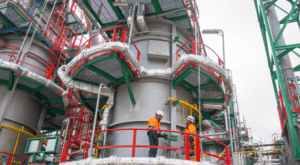Repsol begins large-scale biofuel production at Cartegena plant

This plant will be the first on the Iberian Peninsula dedicated exclusively to the production of 100% renewable fuels.
The company has invested €250 million in the construction of the unit, which has a production capacity of 250,000 tons per year.
It can produce renewable diesel and sustainable aviation fuel (SAF), which can be used in any means of transport: cars, trucks, buses, ships, or aircraft and with existing refuelling infrastructure.
The renewable fuels are produced from organic waste, such as used cooking oil or agri-food waste, thereby giving a second life to these types of residues. They are a quick and cost-efficient solution for the decarbonization of all transport sectors.
The production of 100% renewable fuels at the plant in Cartagena will avoid the emission of 900,000 tons of CO2 a year, since they reduce net emissions by 90% compared to the mineral fuel that they replace due to the lower carbon intensity of the former.
Repsol's executive managing director of industrial transformation and circular economy, Juan Abascal, said: "With this first plant on the Iberian Peninsula we are taking another step forward in our transformation towards decarbonization, with a cutting-edge technological project.”
The new plant will process 300,000 tonnes of organic waste a year - used cooking oil, among others - prioritising residues of national and European origin.
Repsol is certified under the ISCC-EU Voluntary Sustainability Scheme and the Spanish National Sustainability Verification System, ensuring traceability and the production of sustainable biofuels in accordance with Renewable Energy Directive (RED) standards.














